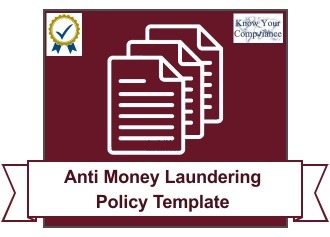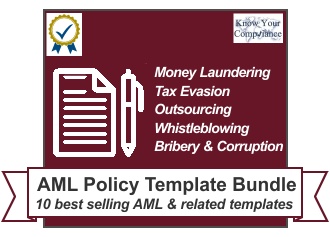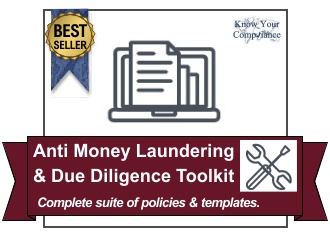AML Policy Template for Accountants
Accountancy Money Laundering Supervision
 Businesses and sole traders with obligations under the Money Laundering Regulations (MLR) are required to be regulated by a supervisory authority. These include bodies such as the FCA, HMRC, The Gambling Commission and certain professional bodies. Businesses operating as an accountancy service provider are overseen by the HMRC and in additon to the MLR obligations, have specific requirements they must comply with.
Businesses and sole traders with obligations under the Money Laundering Regulations (MLR) are required to be regulated by a supervisory authority. These include bodies such as the FCA, HMRC, The Gambling Commission and certain professional bodies. Businesses operating as an accountancy service provider are overseen by the HMRC and in additon to the MLR obligations, have specific requirements they must comply with.
The HMRC states that an accountancy service provider is a sole practitioner or business providing the below services: –
- Auditors carrying out statutory audit work
- Accountants providing accountancy services to clients
- Tax advisers and consultants providing advice to clients about their tax affairs
- Payroll agents providing accountancy services or tax advice
- Customs practitioners, freight forwarders and similar businesses where providing accountancy or tax services.
Anti Money Laundering Policies & Controls
The MLR requires any business obligated under it to: –
- establish and maintain policies, controls and procedures to mitigate and manage effectively the risks of money laundering and terrorist financing as identified in any risk assessment
- regularly review and update the policies, controls and procedures
- maintain a record in writing of: –
- the policies, controls and procedures
- any changes to those policies, controls and procedures made as a result of any review
- the steps taken to communicate those policies, controls and procedures, or any changes to them, within the business.
Those supervised by the HMRC are also required to apply for the fit and proper test and register with the HMRC and carry out company-wide risk assessments to assess for money laundering and terrorist financing risks. The HMRC also provide guidance on the extended MLR requirements such as training, customer due diligence, reporting and record keeping.
Additional information for who should register with the HMRC and specific guidance for those providing accountancy services are available on their website.
AML Policy Template
Having a detailed Anti Money Laundering (AML) Policy is mandatory for those with MLR obligations and using a professional AML Policy Template can help to ensure compliance and save time. An Anti-Money Laundering Policy Template should be more than a few pages of generic policy content. It should provide guidance for both the business and its employees and define the objectives, controls and requirements the company has.
Our AML Policy Template is suitable for firms supervised by the HMRC, FCA, Gambling Commission and other related professional bodies. It extends to 37 pages and also includes an MLRO Reporting Template, AML Risk Assessment Template, SAR Template and an Employee Screening Assessment Template.
For firms looking for a more robust approach to AML compliance, we also offer our AML Policy Bundle and AML Toolkit which cover additional supporting policies and templates such as whistleblowing, due diligence, outsourcing, risk management and more.




